| EMPLOYMENT
SCREENING NEWS |
2014 Baker’s Dozen Customer Satisfaction
Surveys: Screening
HRO Today’s
Baker’s Dozen rankings are based solely on feedback from
buyers of the rated services. Once collected, response data
are loaded into the HRO Today database for analysis to score
each provider that has a statistically significant sample. In
order to determine an overall ranking, HRO Today analyzes results
across three subcategories: service breadth, deal sizes, and
quality using a predetermined algorithm that weighs questions
and categories based on importance. Their rankings are based
on those scores.
Read
more

The
FCRA is the new FLSA
Recent
multi-million dollar settlements highlight the importance for
employers of complying with the Fair Credit Reporting Act (FCRA)
and highlight that, when it comes to class action lawsuits in
the employment-law context, the FCRA is the new FLSA!
The FCRA
has very specific requirements employers must comply with if
they engage a background check service providers to compile
background reports on job applicants. These types of reports
include credit reports, criminal background reports, and other
reports that have any bearing on someone's moral character or
reputation. Even employers who do comply with these four broad
requirements tend to miss some of the more intricate, lesser-known
requirements that each step further requires.
The FCRA
is not an easy statute to comply with. In addition. It is advisable
that employers conducting background checks of any kind on applicants
or employees consult with competent counsel to review their
forms and their processes to ensure they are FCRA compliant
in all respects - even if the background screening company assures
them their forms are compliant.
Read
more

The Bruce Berg Report on the NAPBS 2014 Annual Conference, Denver,
CO
While the
attendance didn't match the last couple of years, this conference
was even better than the last one (see the full report for attendance
breakdowns.) The mood of the attendees was definitely upbeat.
There is nothing like a good economy to boost sales, profits
and moods.
The committees
and NAPBS have accomplished a ton of work this past year. If
you think people are not working hard (volunteering) to accomplish
things for the industry, read their meeting minutes at http://www.napbs.com/about/index.cfm
If you
are not a member of NAPBS, call me and let me explain why there
is no reason for not helping our association that does so much
for the industry in which you are involved. The annual NAPBS
budget is about $1,500,000. Contribute, join, learn, be active,
benefit. Governments (federal, state and local), continue to
make decisions that impact your business. As a member, your
dues contribute to our legal costs to defend you before all
these uninformed, misinformed and biased legislators (I just
logged on and paid my 2015 dues).
Conference
Presentations included some great topics and suffice to say
the conference is a non-stop learning experience.
Sunday night was excellent. From 5-6pm was
a new member meet-and-greet and about 100 people attended. Then
6-7pm for the opening ceremony and 7-10pm on the exhibit floor
with food, open bar, exhibitors, networking, information exchange,
old and new friends, hugs and handshakes. We really do have
a good bunch of people in our industry.
Read the full report

Fraud
Experts Offer Advice on Preventing Fraud When Hiring Seasonal
Staff!
With seasonal
hiring in the U.S. expected to be at its highest level in years,
fraud experts warn that companies that loosen their usual processes
in order to add staff quickly put themselves at increased risk
to fraud. According to the Association of Certified Fraud Examiners
(ACFE), the world's largest anti-fraud organization, employee
background screening, proper training and following an ethical
code of conduct are among crucial measures for reducing fraud.
By skipping these controls, a company increases its risk - and
may even unwittingly add a serial fraudster to its ranks for
the holidays.
Two experts
who regularly provide training to anti-fraud professionals shared
their tips for organizations that are hiring seasonal employees..
Read
more

How
Do Global Businesses Know When EU Data Protection Law Applies
to Them?
At the
heart of EU data protection law is the passionate belief in
the right to privacy. Indeed, the Treaty of Lisbon has now recognised
both privacy and data protection as fundamental rights under
EU law.
Yet, like
any other law, it must be clear when and where EU data protection
rules apply and the applicable law provision in the current
Data Protection Directive (Directive) has caused some headaches.
Following
the Google Spain decision, all global businesses should take
note of how they may be brought within the scope of EU data
protection law even if it appears that a non-EU based part of
their business is involved in different services from EU operations.
Certainly a global business without a clearly identified EU-based
controller should consider establishing an entity in one Member
State in order to conduct all data processing subject to EU
rules through that entity and the law of that Member State.
Going forward,
the new Regulation's likely direction of travel will include
applying EU data protection law to online services and behaviours
that target EU individuals. Therefore, global businesses should
think through how their online offerings are positioned and
the likelihood that their customers are or will be EU individuals.
In particular, global businesses operating online tracking or
profiling technologies are far more likely to be caught by the
scope of the new Regulation and would do well to prepare for
it.
Read
more

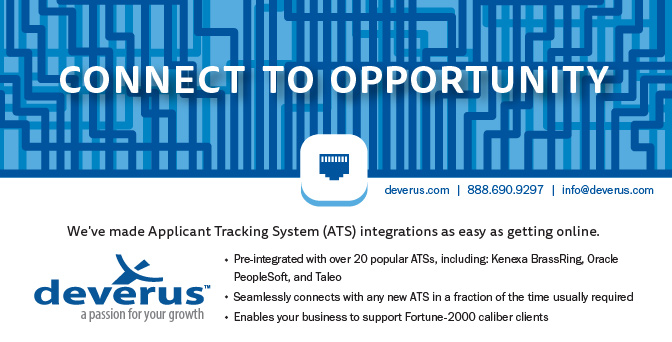

Federal
District Court Vacates HUD Disparate Impact Rule
In a
Fair Housing Act (FHA) case we have been watching for some
time, the federal district court in Washington, D.C., recently
issued an opinion vacating the U.S. Department of Housing and
Urban Development's (HUD's) disparate impact rule on the ground
that "the FHA prohibits disparate treatment only, and
that the defendants, therefore, exceeded their authority" under
the Administrative Procedure Act (APA). The court's concluding
admonition- "This is yet another example of an Administrative
Agency trying desperately to write into law that which Congress
never intended to sanction."- could just as easily have been
directed to the Consumer Financial Protection Bureau's assertion
in Bulletin 2013-02 that disparate impact claims are cognizable
under the Equal Credit Opportunity Act (ECOA).
The case,
American Insurance Association v. U.S. Department of Housing
and Urban Development, was brought by two industry trade
associations whose members sell homeowners' insurance.
Read more

VerticalRent
Announces No Cost Tenant Screening for Landlords and Property
Managers
VerticalRent
has collaborated with Experian to offer an estimated 40 million
independent landlords in the U.S. a no-cost tenant screening
service complete with an online rental application and full
credit report with VantageScore® credit score. The applicant
simply has to log into VerticalRent, verify his identity and
affirmatively consent to have his credit report shared with
the landlord. The applicant pays a $50.00 application fee, which
provides the landlord with access to the applicant's online
rental application, Experian credit report, criminal, and eviction
report. Taking it a step further, the landlord can convert the
rental app into a state-specific lease agreement, manage cash
flow and collect rent online - all with VerticalRent.
Read
more

Publix
to Pay $6.8 Million in Class Action Settlement
Publix
Super Markets Inc. is scheduled to pay nearly $6.8 million in
a class-action lawsuit settlement over background checks. The
lawsuit, being handled in Tennessee federal court, alleges that
Publix violated the Fair Credit Reporting Act (FCRA) by not
making legally required disclosures about background checks
to job applicants. Publix has denied any wrongdoing and was
not found liable in court, but agreed to the settlement "because
of the substantial expense of litigation ... and the disruption
to its business operations," according to legal documents filed
in July.
The settlement
includes people who applied for work at Publix stores and were
subjected to background checks during the period March 12, 2012,
to May 13, 2014.
Read
more

Terminating an Employee for Not Fully Disclosing His Criminal
History in an Application for Employment Did Not Violate the
Pennsylvania Criminal History Record Information Act
In McCorkle v. Schenker Logistics, Inc., 2014 WL 5020598
(M.D. Pa. October 8, 2014), the court held that terminating
an employee for not fully disclosing his criminal history, as
requested in an employment application, did not violate the
Pennsylvania Criminal History Record Information Act (CHRIA),
18 Pa. Con. Stat. §9125, because the termination was based
on the applicant's misrepresentation, rather than the criminal
convictions.
Read
more

NH
Legislature Restricts Employer Access to Employee's Personal
Social Media
The New
Hampshire Legislature passed HB
1407 which will prohibit employers from obtaining an employee's
personal social media account user name and password. The bill
passed both the House and the Senate. The governor is expected
to sign it into law.
This bill
applies to both employees and prospective employees for employment.
HB 1407 does not prevent an employer from monitoring company
equipment and email, adopting workplace policies on the use
of employer property (including Internet use, social networking
site use or electronic mail use), or requesting disclosure of
login information where the social media account is paid for
by the employer or provided to employee as part of employment
relationship.
Read more

| Welcome
to the U.S. Legal Challenge Question! |
Sponsored
By:


As the background
screening industry continues to get more competitive the firms
that will ultimately succeed will be those that create competitive
advantage through their people by offering continuous learning
opportunities to heightened their knowledge and capabilities.
We believe that having employees that are very knowledgeable about
the legal landscape of background screening is essential to continued
success.
We are grateful
to Larry D. Henry who began his law career with the Army JAGC
where he tried over 2,000 cases. After the Army he relocated to
Tulsa. In 1981, the founder of DAC Services contacted Mr. Henry's
firm for assistance in creating a background screening company.
Since Mr. Henry's practice was employment law, the firm believed
this fell within his area and as they say: "the rest is history".
His practice has kept him in continual contact with the background
screening industry, and he is a nationally recognized expert in
the area of background screening.
Mr. Henry's
practice is concentrated on employment law and in specific, background
screening of employees. He represents consumer reporting agencies
throughout the United States and two national trade associations.
He is the author of the Criminal Records Manual and the on line
reference site:CRAHelpDesk.com, and he is a frequent presenter
across the country on various topics dealing with background screening.
Please choose
your answer by clicking on it:

Fair
Credit Reporting Act (FCRA) Preempts Tortious Interference Claim,
Says NJ Court
The Fair
Credit Reporting Act specifically contains a provision that bars
state law claims against employers who "furnish information" to
CRAs. In a recent decision-Saget v. Wells Fargo Bank, N.A.,
No. 2:13-03544(WJM), 2014 WL 4494801 (D.N.J. Sept. 10, 2014)-the
District of New Jersey had occasion to invoke this provision.
The plaintiff
filed suit against the defendant for tortious interference with
prospective economic advantage, alleging that the report prevented
him from obtaining employment in the banking and finance industry.
The Court held, however, that FCRA preempted the plaintiff's state
law claim. This decision suggests that employers in the banking
and finance industry may be able to avoid state law claims for
tortious interference or defamation when reporting the misconduct
or poor performance of former employees to CRAs.
Read
more

Admissions
of Drug Use By Employees Are Not The Same As Positive Test Results
in Minnesota
A common
occurrence when employees are confronted with a requirement to
take a drug test: they often confess. Sometimes they suggest that
the employer need not bother with the test because they know they
will test positive. Under the Minnesota Drug and Alcohol Testing
in the Workplace Act ("DATWA"), admissions of drug use and a positive
drug test have very different legal ramifications. In Minnesota,
"an employer may not discharge an employee for whom a positive
drug test result . . . was the first such result for
the employee on a drug or alcohol test requested by the employer"
unless the employee has been given the opportunity to participate
in and complete a drug counseling or rehabilitation program.
Read
more



| ALCOHOL
& DRUG SCREENING - (continued) |
What
Does Alaska's and Oregon's Legalization of Marijuana Change for
Employers?
On November
4, Oregon, Alaska, and the District of Columbia became the latest
jurisdictions to pass referendums decriminalizing the recreational
possession and use of small amounts of marijuana. Oregon's law
becomes effective in July 2015; Alaska's probably in February
2015.
Each of these
laws is slightly different (read the full text here of the measures
in Oregon,
Alaska,
and
D.C..). Employers in all these jurisdictions are likely wondering
about how does this affect my company's anti-drug policy or drug
testing program? The short answer is that none of these laws will
change much for employers. The laws primarily simply decriminalize
the personal and private possession and recreational use of small
amounts of marijuana. They do not impose any new limits or obligations
on employers, or create any new rights for employees when they
are at work.
Read more

Montgomery
County Maryland Passes Bill to Ban the Box
A Plan to Cut Costs and Crime: End Hurdle to Job After Prison
Prince George's bill would bar questions
about criminal convictions on job applications
City officials remove important question from application process
South Bend councilwoman wants to make it easier for ex-cons to
get jobs
From criminal record to clean slate in Philly's Promise Zone
New
'Ban the Box' law tripping up Minnesota employers
'Ban the box' More complicated than we thought
Tampa considers extending 'ban the box' policy to city vendors
Harrisburg explores removing questions about criminal history
from city job applications
'Ban the Box' Campaign Discussed In Mobile
Chattanooga-Hamilton County NAACP seeks to strike criminal record
questions from job applications
Jackson, Mississippi Council Push to Ban the Box for Convictions
Felon check box to be removed from Wyandotte County UG applications
Chicago Proposes "Banning The Box"
U.S.
Services Sector Slows; Private Payrolls Increase
U.S. services
industry activity slowed for a second straight month in October,
the latest indication the economy has lost some momentum. Still,
the economy remains on solid footing as other data on Wednesday
showed a pick-up in private sector hiring last month. Nevertheless,
the key services sector, which accounts for roughly two-thirds
of the economy, remained solidly in growth mode.
Separately,
the ADP National Employment Report showed private payrolls increased
by 230,000 in October, for a record seven straight months of job
gains exceeding 200,000. Private hiring had risen 225,000 in September.
Job gains last month were broad-based, with mid-sized businesses
adding the most workers in more than seven years
Read
more

When
it Comes To Fraud, What is The Cost of Complacency?
The ACFE
invites you to publish and/or post for your audience our new infographic,
"The Cost of Complacency."
When it comes
to fraud, what is the cost of complacency? Research conducted
by the Association of Certified Fraud Examiners (ACFE), the world's
largest anti-fraud organization, indicates that the longer a fraud
lasts before it is detected, the more the victim organization
stands to lose.
A new infographic
illustrating the relationship between anti-fraud controls and
the duration and cost of fraud has been made available by the
ACFE for download online at
FraudWeek.com. The data was compiled by the ACFE for its
2014 Report to the Nations on Occupational Fraud and Abuse.
The full
Report is available for download (in PDF format) online at: http://www.acfe.com/rttn/docs/2014-report-to-nations.pdf.

Public
Record Update
Sponsored by:
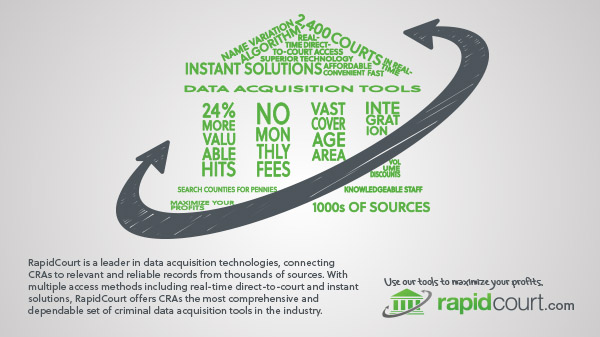
Public
Record Update
By Mike Sankey, PRRN
| BRB
PUBLICATIONS LAUNCHES CriminalRecordSources |
CriminalRecordSources.com
(CRS) is your authoritative reference about criminal records.
CRS tells you the pros
and cons
of searching different record repositories. CRS is your information
source for:
-
Where:
The locations of criminal records - from both government agencies
and vendors;
- How:
The ways criminal records may be directly accessed;
- Accuracy:
The accuracy and value of a criminal record will vary
by location.
CRS will
help anyone involved with the use of criminal records including
private investigators, attorney firms and
law libraries, background screening firms, HR, journalists and
the news media, risk management and corporate
compliance divisions, trade associations, legislative staff, and
government agencies to name a few.
For more
information visit http://www.criminalrecordsources.com/
| THE
PUBLIC RECORD RETRIEVAL NETWORK (PRRN) |
The Public
Record Retrieval Network (PRRN) is one of the largest U.S. trade
organizations representing professionals in the public record
industry. With more than 500 members in 45+ states who retrieve
documents from local government agencies in over 2,000 counties
nationwide, PRRN Members are recognized as the nation's leaders
in local public record searching and document retrieval.
What Do
PRRN Members Do?
Simply put, PRRN Members are professionals who visit government
agencies on-site-such as local, federal, and state courts or recorder's
offices-to do name searches and/or obtain copies of file documents.
Retrievers are often hired in conjunction with the pre-employment
screening, investigations, lending, litigation, or for legal compliance
(e.g., incorporations).
As recognized leaders in local public record searching and document
retrieval, PRRN Members agree to follow standards of professional
conduct for local searching and document retrieval procedures
and to follow the highest standards of ethics and conduct in all
their dealings with other members and with clients.
For more information click
here.
Public Record
Retriever Network - www.PRRN.us
The CRA Help Desk - www.CRAHelpDesk.com
Motor Vehicle Record Decoder - www.MVRDecoder.com
BRB's Public Record Blog - www.publicrecordsblog.net
BRB's Bookstore - www.brbpublications.com/books/

 Relationship Between Job Applicants'
Criminal Histories and Hiring Practices Examined in Nationwide
Survey by First Advantage Relationship Between Job Applicants'
Criminal Histories and Hiring Practices Examined in Nationwide
Survey by First Advantage
First Advantage announced the findings of a recent survey focused
on its current United States customer base's tendencies related
to criminal background checks. Of note were findings regarding
applicants' criminal histories and hiring trends toward those
applicants.
According to this nationwide study of First Advantage customers:
· 37
percent of companies report being unsure about when to order a
federal criminal search versus a county search.
· 38
percent of companies don't understand the difference between a
database search and county courthouse search.
· 45
percent of companies report they have candidates that require
criminal background checks in multiple countries.
· 43
percent of companies report the major risks of not screening are
potential legal action and damage to their brand reputation.
Read
more

 Securitec Focus on Compliance and
Technology Improves Results for CRA's Securitec Focus on Compliance and
Technology Improves Results for CRA's
Securitec
Screening Solutions, a 100% wholesale background research intelligence
firm, announced new offerings designed specifically for CRAs for
Compliance Support and Real-Time Compliance-Filtered Results.
"CRAs need
support which not only meet the complex demands of FCRA compliance
and conflicting State laws but also specific industry screening
requirements," states Jessica James, CEO of Securitec. "With lawsuits
on the rise, CRAs know they cannot rely exclusively on database-only
providers or "data dumper-only" solutions. Database only sources
are stale and out of favor. The data dumper solutions return false
positives, miss records, and have no FCRA filtering. They simply
do not offer all jurisdictions, especially the thousands of sources
that are not on-line and require a physical visit to the court
house to get real-time results. There is another layer of service,
technology, and compliance control required today."
Securitec
now offers this layer of real-time compliance-focused results
for CRAs in a simple price per search model. There is also a new
service available to augment the Compliance team for our CRA clients.
Read
more

 SJV & TazWorks Announce Enhancement
to XML Interface with MedEx, SJV's Medical Exclusion, Medical
Board Actions, and Licensing Solutions SJV & TazWorks Announce Enhancement
to XML Interface with MedEx, SJV's Medical Exclusion, Medical
Board Actions, and Licensing Solutions
SJV &
Associates, a leading provider of public records research to the
Pre-Employment and Background Screening Industries, announced
that its system-to-system integration with TazWorks, the front-runner
in background screening software, has been expanded to support
SJV's new Medical Provider Data Products: MedEx. MedEx allows
clients of SJV to check Medical Exclusions (Medicare/Medicaid),
both at the Federal and State Level, Medical Board Actions, and
License Checks for all provider types, while providing ongoing
Monitoring.
For more
information visit http://www.prweb.com/releases/2014/11/prweb12307792.htm

 TazWorks Integrates With 100 Applicant
Tracking Systems TazWorks Integrates With 100 Applicant
Tracking Systems
TazWorks
LLC, the front-runner in background screening software, reached
a milestone by completing 100 integrations with Applicant Tracking
Systems (ATS). These integrations enable background screening
agencies to combine the power of TazWorks InstaScreen™ with
the convenient and streamlined hiring process that tracking systems
offer to employers and landlords. Integration improves turnaround,
lowers costs, increases data security, and reduces human error,
allowing for a healthier bottom line.
Read
More

| Welcome
to the eVerify Challenge Question! |
Sponsored
By:
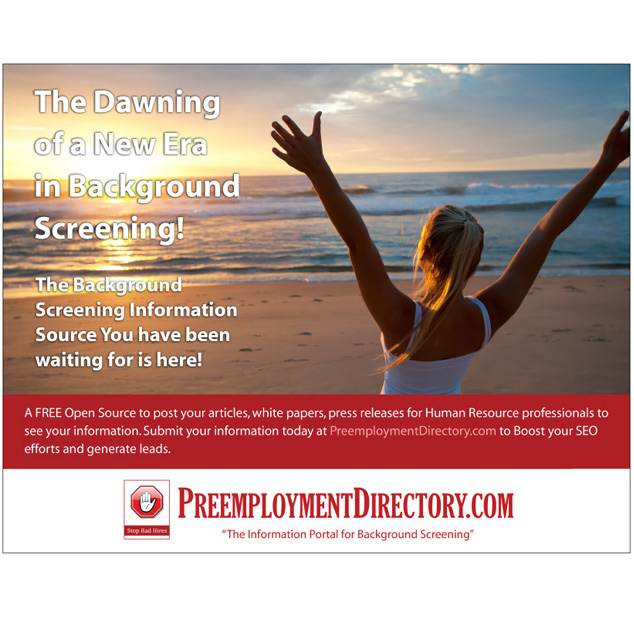

 Nicole A. Kersey Nicole A. Kersey
Managing Director, Kersey Immigration Compliance, LLC
nkersey@kerseyimmigration.com
Nicole A.
("Nici") Kersey is an attorney whose practice is dedicated to
employment-based immigration, with a focus on the Form I-9, E-Verify,
and related immigration compliance issues. Nici represents employers
before, during, and after Form I-9 inspections by Immigration
and Customs Enforcement (ICE), providing practical advice to and
serving as an advocate for employers during negotiations and litigation
relating to fines for I-9 violations. She is a frequent trainer
and speaker on I-9 and E-Verify issues. Nici is a graduate of
the University of Virginia School of Law and provides pro bono
representation to the spouses of U.S. soldiers and to arts organizations.
The
Challenge Question:
What
Should An Employer Do On The Form I-9 When An Employee's Name
Changes?
I have an
employee who just got married, and she changed her name. What
do I do on the I-9 to reflect this change?
A.
Nothing.
B.
Complete a new I-9.
C.
Input the employee's new name in Section 3. Make and keep a copy
of the employee's new Social Security card, and retain it with
the Form I-9. Sign, print your name, and date Section 3.
D.
Input the employee's new name in Section 3. Sign, print your name,
and date Section 3.
E.
The employer can choose between A and D.
F.
The employer can choose between B and C.

| EVERIFY
& IMMIGRATION ISSUES |
Sag Harbor
7-Eleven Owners Plead Guilty to Federal Charges
According
to court records, the former operators of Sag Harbor's 7-Eleven
who also controlled 14 7-Elevens stores in Long Island and Virginia
provided their employees with more than 20 identities stolen from
United States citizens, housed those employees at houses they
owned and skimmed large portions of their employees' wages.
"Using the
7-Eleven brand, the defendants dispensed wire fraud and identity
theft, along with Big Gulps and candy bars," U.S. Attorney for
Eastern New York Loretta Lynch said in a release. "In our backyards,
the defendants not only systematically employed illegal aliens,
but concealed their employment by stealing the identities of children
and even the dead."
Read
more

One
Site! Many Suppliers! |
2013-2014
SUPPLIERS TO THE BACKGROUND SCREENING
INDUSTRY BUYERS GUIDE NOW AVAILABLE!
Looking for the Top Suppliers in the Industry? Need to find a
new Supplier?
Visit our VENDOR SHOWCASE
which features suppliers to the Background Screening Industry.
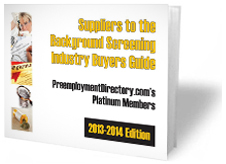
Click
here or on image to get a copy
THE
2015-2016 GUIDE IS COMING!
RESERVE
YOUR SPACE TODAY!

 Kevin Coy is a Partner in the Washington DC office of Arnall
Golden Gregory LLP. Kevin
Kevin Coy is a Partner in the Washington DC office of Arnall
Golden Gregory LLP. Kevin
advises background screening companies and other clients on a
wide range of privacy and consumer regulatory issues, including
Fair Credit Reporting Act, Gramm Leach Bliley Act,
Drivers' Privacy Protection Act, and Dodd Frank Act compliance
issues, as well as data breach matters. Kevin also represents
clients with matters before the Federal Trade Commission, the
Consumer Financial Protection Bureau, and other consumer protection
agencies.
Kevin can
be contacted at Kevin.Coy@agg.com
or 202-677-4034.
THE WASHINGTON
REPORT
November
2014
On Capitol
Hill
The congressional
elections kicked off the month, and the outgoing Congress has
since returned to Washington for a final "Lame Duck" session expected
to stretch into early December in order to finish its work before
the new Congress takes office in January.
At the
Supreme Court
Plaintiffs
in a class action suit against Sam's Club, Steven E. Hammer
et al. v. Sam's East Inc., have asked the Supreme Court revive
their Fair Credit Reporting Act (FCRA) suit against the Company
over its credit card receipt truncation practices.
At the
CFPB
The Consumer
Financial Protection Bureau (CFPB) finally has published a user-friendly
version of its "Summary of Your Rights Under the Fair Credit Reporting
Act" (FCRA). The summary is required under §609(c)(1) of
the FCRA, and must be provided to job applicants during the pre-adverse
action process.
Read
the full report


2013
Best Advertisers of the Year Awards
Suppliers
to the Background Screening Industry
The Winning Teams!

- Best
Headline - CRI Group
|
- Best
Brand Awareness - Convergence Research
|
- Most
Appealing -Omni Data Retrieval
|
- Most
Effective Message - CRI Group
|
Click here to see slide show of winners

STOP
STRUGGLING WITH WRITING AND PUBLISHING YOUR NEWSLETTER: |

We can help
you have a high quality e-newsletter to help nurture your relationship
with your clients and attract new clients. Our customized newsletter
service will take over your newsletter task or create a new one
for you. We can manage the creation of your newsletter for you.
We are constantly
researching information to use for The Background Buzz and
you can put our research to use for you. Using the information
rich content from The Background Buzz (minus the ads
and competitors information) we will create a custom newsletter
for you.
Use your staff’s
time to do more valuable work and save all the hassle of researching
or writing articles, formatting and managing all the other ezine
tasks with our customized ezine process.
Contact Barry
Nixon at 949-770-5264 or at wbnixon@aol.com
for more information.

Drug and Alcohol Testing at the Workplace - Emerging Trends
Drug and
alcohol policies have been in the spotlight in 2014.
There have
been a number of key developments and trends that are worth noting:
· There
is a growing consensus that urine based testing for drugs is not
the Fair Work Commission's ( FWC) preferred method
for testing for impairment.
· However,
there has been a small shift towards recognising the reasonableness
of policies that allow businesses, in some cases, to test for,
and take disciplinary action in respect of, evidence of drug use
generally - regardless of whether the use has caused any impairment
at work.
· Increasingly,
governments are seeking to regulate in this space. The most notable
example of this is the Victorian Construction Code which includes
specific requirements for employers working on government-funded
construction projects to have and implement drug and alcohol policies.
Anecdotally, many employers have deferred the introduction of
testing regimes because of union and privacy concerns. However,
the combination of government and regulator interest coupled with
the potential consequences of inaction, means that for many employers,
doing nothing is no longer an option.
Read
more
EU Mulls Conferring Binding
Powers on Body of Data Privacy Regulators
A new body
of European data protection authorities could have the power to
adopt legally binding decisions in cross-border disputes over
a company's misuse of personal data, according to a draft document
seen by Reuters. Under a mechanism originally proposed in reforms
of Europe's data protection laws, businesses operating across
the 28-nation European Union would have to deal only with the
data protection authority in the country where they are headquartered
- even if alleged mishandling of data affects citizens in another
country.
A new proposal
by Italy, which holds the rotating European presidency, gives
all concerned authorities the chance to intervene in all stages
of the decision-making process. A failure to reach an agreement
between the authorities concerned, or even conflicts over which
regulator should take the lead, would then be arbitrated by the
European data protection Board, with legally binding powers.
Read
more

EU
Data Protection Regulation: A Tipping Point Has Been Reached
The proposed
EU General Data Protection Regulation will be finalized in 2015.
That was the conclusion of leading lights of the EU data protection
scene at a standing-room-only event in Brussels on Wednesday.
It appears
that a tipping point in the negotiations has been reached. The
Council of the European Union (the 28 EU member states) needs
to finalize its version of the draft regulation before negotiations
can enter their final stage, but it has made incremental progress
in the last 12 months. Enrico Costa, Italy's deputy minister for
justice, has now confirmed that the Italian Presidency, which
runs until the end of this year, intends to present agreed proposals
on the public sector and the regulatory one-stop shop (OSS) at
the meeting of the Justice and Home Affairs Council (Council of
Ministers) on 5 December. If agreement can be reached on these
two areas it will represent a remarkable achievement, as these
have been seen as insurmountable obstacles to progress.
Read more

Adverse
Media Screening and the Right to be Forgotten
Screening
for adverse media can be a challenge. However, with the E.U. commission
ruling that many items can be removed from Google, this challenge
has become harder. As such, there is greater benefit for proprietary
databases that are not subject to such regulation.
To illustrate
the point consider that recently, according to several news sources,
details of a case reporting that Mohamed Alie Barrie, 38, of Pinewood
Close, Dartford, being charged with conspiracy to defraud, conspiracy
to money launder and money laundering were removed from Google's
searches - meaning that such search results are no longer discoverable
within Google.
Read
more
Guam
Legalizes Medical Marijuana
Voters in
Guam approved a ballot initiative that would legalize marijuana
for "debilitating medical conditions" such as epilepsy, HIV, cancer
and glaucoma. The bill, which passed by
more than 56 percent , makes Guam the first U.S. territory
to legalize medical pot.
The decision
marks the first victory in a
flurry of marijuana-related ballot measures this Election
Day.
Tom Angell,
chairman of the advocacy group Marijuana Majority, told HuffPost,
"People all across the world are ready to move beyond failed prohibition
laws, especially when seriously ill patients are criminalized
just for following their doctors' recommendations."
Criminal Police Verification Checks: A Tale of Blatant Loopholes
In India,
criminal police verification reports are often the main, if not
the only, component of a criminal background check. Ideally, they
should help verify if an individual has been involved in any criminal
activity and has pending criminal cases in jurisdictional police
offices records.
These reports
involve checking records at the commissioner of police office/superintendent
of police office and the local police station, as applicable,
based on a candidate's address and local or state regulations.
However, there are specific challenges with these reports that
render them less effective, often inaccurate, and potentially
non-compliant with a variety of local, regional, and international
regulations and guidelines. The various challenges in conducting
a police verification check include:
An individual
with a criminal background in one part of city, state or country
could relocate to within India and appear to have no criminal
record on a local police verification. Pair this stark coverage
gap with all of the issues above and this verification method
is highly ineffective and potentially futile if not performed
through a formal process.
Read
more

Background
Checks Yet To Begin In Most Schools
A majority of the schools in the city say the police are yet to
begin the verification process for their staff members, despite
being given all the details. After the sexual assault of a girl
student in a Bangalore East school, police had made background
verification mandatory.
The school managements were told to provide details of staff members
along with their addresses to the police. This would be scrutinised
and the files sent to the jurisdictional police station, from
where the police would visit their homes. However, schools say
that the process is yet to be completed.
When contacted, Additional Commissioner of police (law and order)
Alok Kumar said, "We have already started the process of background
verification. If any school feels that the verification is not
done in their schools, they are free to approach us again."
Read
more
Optional
DPO proposal 'advantageous to larger entities'
The Polish
Parliament ('the Parliament') adopted, on 7 November 2014, an
act on facilitation of performance of business activity ('the
Amendment') to the Personal Data Protection Act of 1997 ('the
Act'), which, among others, would make the appointment of a Data
Protection Officer (DPO) optional while strengthening the role,
as businesses would have to ensure that DPOs perform their tasks
independently and report directly to the CEO.
In particular,
companies which appoint a DPO and notify them to the Polish Data
Protection Authority (GIODO), would be released from the notification
obligation. However, companies that do not appoint a DPO will
still need to perform the DPO's tasks.
Read
more
Insights
from the Russian Data Protection Authority's conference on personal
data protection
On 5 November
2014, the Russian Data Protection Authority, Roskomnadzor, held
its fifth annual conference on "Personal Data Protection." The
conference provided insight into the motivations prompting the
enactment of Russia's data localization law - which requires the
personal data of Russian citizens to be stored within the territory
of the Russian Federation. The conference was well-attended.
Roskomnadzor
officials stated that the purpose of the law is to ensure the
storage of personal data of Russian citizens within Russia in
order to better protect the data. He pointed out that the law
contains no express prohibition on cross-border data transfers,
but cautioned that in each case, such transfers should be conditioned
on and connected with a legitimate purpose under Russian data
protection law beyond mere storage.
Read
more
Singapore
Sees Increase in Foreign Workers Using False Credentials to Get
Work Passes
Singapore's
Ministry of Manpower (MOM) prosecuted an estimated 150 foreign
workers between 2012 and the first half of this year for providing
false credentials, according to Manpower Minister Tan Chuan-Jin,
reports The Straits Times . All were
jailed, had their work passes revoked, and were barred from working
in Singapore in future, Mr Tan advised. He added that his Ministry
had tightened requirements and also supplements its checks with
third-party overseas screening agencies and verifies the authenticity
of certificates directly with issuing educational institutions.
Read more
Update
on South Africa's Data Protection Regime
Data protection
in South Africa is regulated under the broad constitutional right
to privacy, the common law, and a few pieces of legislation that
contained interim provisions relating to data protection. Until
very recently, South Africa did not have data protection‑specific
legislation. With the increase in electronic commerce globally,
large industries managing computerised databases of millions of
individuals' records and the surveillance potential of computer
systems, prompt demands for specific rules governing the collection
and handling of personal information arose.
The South
African Law Commission finalised an investigation into privacy
and data protection in South Africa, and recommended the creation
of the Protection of Personal Information Act (the "Act"). Although
signed into law in November 2013, April 2014 marked the partial
commencement of the Act with only several sections coming into
force, including those related to the establishment of the information
regulator, the issuance of regulations to the Act and the definitions
clause which, in the latter instance, codified concepts crucial
to data protection including "processing" and "personal information."
Read
more
'Unique'
draft bill applies to both controllers and processors
The Government
of Uganda opened a public consultation, on 15 November 2014, regarding
the country's draft Data Protection and Privacy Bill 2014 (the
Bill'). If passed by the Ugandan Parliament, the Bill would become
Uganda's first piece of legislation which focuses exclusively
on privacy and data protection.
"A unique
aspect of the Bill is that it makes both the data controller and
data processor responsible to data subjects and the privacy authority,
for non-compliance with the data protection law, compared to most
jurisdictions where responsibility falls solely on the data controller,"
commented Nerushka Deosaran, Associate at Norton Rose Fullbright
South Africa.
Members of
the public have until 12 December 2014 to submit their views on
the Bill
Read
more
Two-Thirds
of New Staff Starting Work Without Reference Checks
Research
compiled by due diligence company HireRight finds that two thirds
of new employees begin working before reference checks have been
conducted. Furthermore, 39 per cent of survey respondees believe
this to be "normal practice" in their industries.
However,
references are found to be an "administrative burden" for HR departments,
with 31 per cent weighed down by queries regarding references
and 27 per cent complaining to management about how long is spent
on the process.
Steve Girdler,
managing director for EMEA at HireRight, states that "By failing
to carry out due diligence before people start work, companies
risk hiring someone who is unable to fulfil the duties of the
role, commits fraud or theft, or damages customer relationships,"
Girdler said.
Read more

Enforced
Subject Access Requests To Be A Criminal Offence From 1 December
2014
It is being
reported that, with effect from 1 December 2014, section 56 of
the Data Protection Act 1998 (DPA) will be brought into force,
which will make it a criminal offence to request an enforced subject
access request.
Currently,
such requests can be used to reveal details of any criminal convictions
that the individual has, which includes information to which employers
would not otherwise have access. For example, a subject access
request made to the Police for information about an individual's
criminal convictions would reveal more details than the individual
would otherwise have to declare to his employer. For example,
that information might include spent convictions under the Rehabilitation
of Offenders Act 1974.
Both the
Information Commissioner and the Disclosure and Barring Service
have expressed concern that enforced subject access requests not
only represent an abuse of an individual's rights but also potentially
undermine important public policies.
Section 56
will prohibit a person from requiring an individual to produce
certain records as a condition of employment or for providing
a service, other than where the relevant record is required by
law or where it is justified in the public interest.
Read
more



|  |
|
|
| |
|
Background
Screening Jobs |
|
Visit
the Job Board for the Employment and Tenant Screening Industry.
Here you will find resumes of people with industry experience
and employers seeking applicants with experience in Employment
and Tenant Screening and related businesses.
www.backgroundscreeningjobs.com


|
UPCOMING CONFERENCES, COURSES & EVENTS |
Feature
Education:
 |
FCRA
Basic Certification Webinar Series Update
The
FCRA Basic Certification program series is now available
for purchase.
For
more information |
2014 Events ( Click
Here to View full list of Events ) - Updated
Monthly
SHRM
State Conferences, visit
http://www.shrm.org/Conferences/StateAffilliateConferences/Pages/default.aspx
Drug
and Alcohol Testing Industry Association (DATIA), 2013 Training
Course Schedule, visit
http://datia.org
SAPAA
Training Institute Learning Events, http://www.sapaa.com/
CUPA-HR
Conferences: http://www.cupahr.org/
World
Federation of People Management Associations, Events,
http://www.wfpma.com/events/by-region#quicktabs-tab-view__events__page_3-4
|
 Tere! (general greeting)
Tere! (general greeting) 
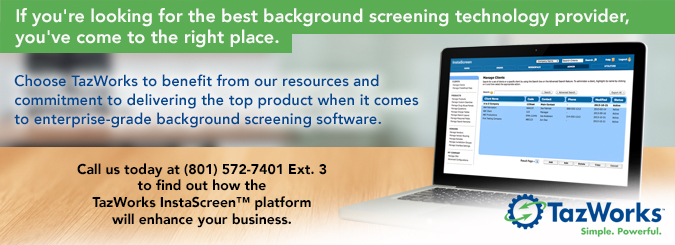





 Relationship Between Job Applicants'
Criminal Histories and Hiring Practices Examined in Nationwide
Survey by First Advantage
Relationship Between Job Applicants'
Criminal Histories and Hiring Practices Examined in Nationwide
Survey by First Advantage  Securitec Focus on Compliance and
Technology Improves Results for CRA's
Securitec Focus on Compliance and
Technology Improves Results for CRA's  SJV & TazWorks Announce Enhancement
to XML Interface with MedEx, SJV's Medical Exclusion, Medical
Board Actions, and Licensing Solutions
SJV & TazWorks Announce Enhancement
to XML Interface with MedEx, SJV's Medical Exclusion, Medical
Board Actions, and Licensing Solutions  TazWorks Integrates With 100 Applicant
Tracking Systems
TazWorks Integrates With 100 Applicant
Tracking Systems 
 Nicole A. Kersey
Nicole A. Kersey 
 Kevin Coy is a Partner in the Washington DC office of Arnall
Golden Gregory LLP. Kevin
Kevin Coy is a Partner in the Washington DC office of Arnall
Golden Gregory LLP. Kevin 





